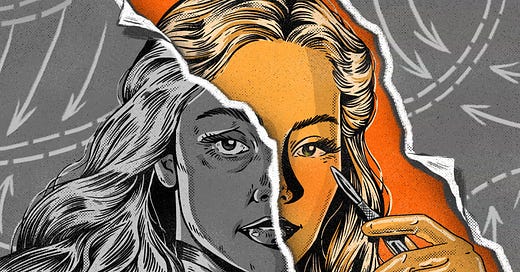The next installment of Ask Ugly, my monthly beauty advice column for the Guardian, is here!
Dear Ugly,
I’ve had hereditary eye bags under my eyes since I was a kid, and I’ve dealt with people telling me that I look tired since I can remember. I’ve tried every eye cream and concealer under the sun, and nothing has hidden them or “cured” them. My mother recently got a blepharoplasty [eyelid surgery], to get hers removed once and for all – and now she’s pressuring me to do the same despite the fact that I’m in my 20s. She looks great, but the idea of changing my face (even if it’s to fix a perceived flaw) makes me sad. Any advice you have for coming to terms with an “imperfection”?
– Not Tired
Thank you for writing in, Not Tired, but of all the people you’ve mentioned, you are the least in need of my advice.
To the people telling other people they look tired: what, I politely ask, is wrong with you? If you encounter someone who seems exhausted enough that it’s temporarily altered their physical form, consider the possibility that 1) they feel it, and therefore do not need you to bring it up, or 2) you don’t know what you’re talking about. The body has a finite number of outputs to signal a near-infinite number of inputs. Under-eye bags might be the result of a sleepless night, sure – but they might also indicate a celebratory evening of sipping champagne, a cross-country flight or allergies. They could be a response to tears (of the happy variety, perhaps), ageing (an inevitability), or genetics (immutable). None of these situations require your commentary. This is entry-level etiquette, folks! Get it together.
(There is one instance in which it’s appropriate to say something about a stranger’s face, and that is if they have spinach stuck in their teeth. Even then, it’s to be done gently and/or discreetly.)
To the mothers encouraging their kids to get elective cosmetic surgery: I know this comes from a place of love. You realize the world will value or devalue your child based on how well they adhere to a narrow standard of beauty, and you want the best for them. Or maybe it comes from a place of hurt – you see a feature you haven’t been able to accept in yourself reflected in your offspring and surgery seems like a permanent solution to their potential pain. Either way, your protection has a paradoxical effect. I’ve spoken to hundreds of girls and women over the course of my career, and most of them can trace their earliest experience of appearance anxiety back not to a cruel world, but a well-meaning family member. Though they might encounter teasing, taunts and judgment from others later in life, it’s the criticism from those meant to accept and support them unconditionally that cuts the deepest. Yours are the comments that are most likely to lead to life-long insecurity – the thing you’re presumably trying to prevent.
But because you asked, Not Tired, I have some advice for you too.
The rest of my answer includes:
why “coming to terms with an imperfection” is flawed framing
how fluffy, feel-good, “everyone’s beautiful in their own way”-type takes are part of the problem
why accepting insecurity as part of the human condition is a more productive and realistic goal than accepting one’s so-called “flaws”
a reminder: “Low self-confidence doesn’t just result from physical matters. How we act can also affect how we feel about ourselves. Would assuaging a bodily insecurity with surgery – which you’ve made clear you do not want – be worth the existential insecurity of not acting in accordance with your values?”
how I’ve personally handled a similar situation
what this woman should say to her mother
and more!
Click through to the Guardian to read the whole thing (and if you decide to share it with friends or on social media or whatever, please share it via the Guardian link).





I loved this column ❤️❤️gave me some ideas on what to say to family members of my own x
you're so hardcore and i love it-- death is the only real security, you're right!